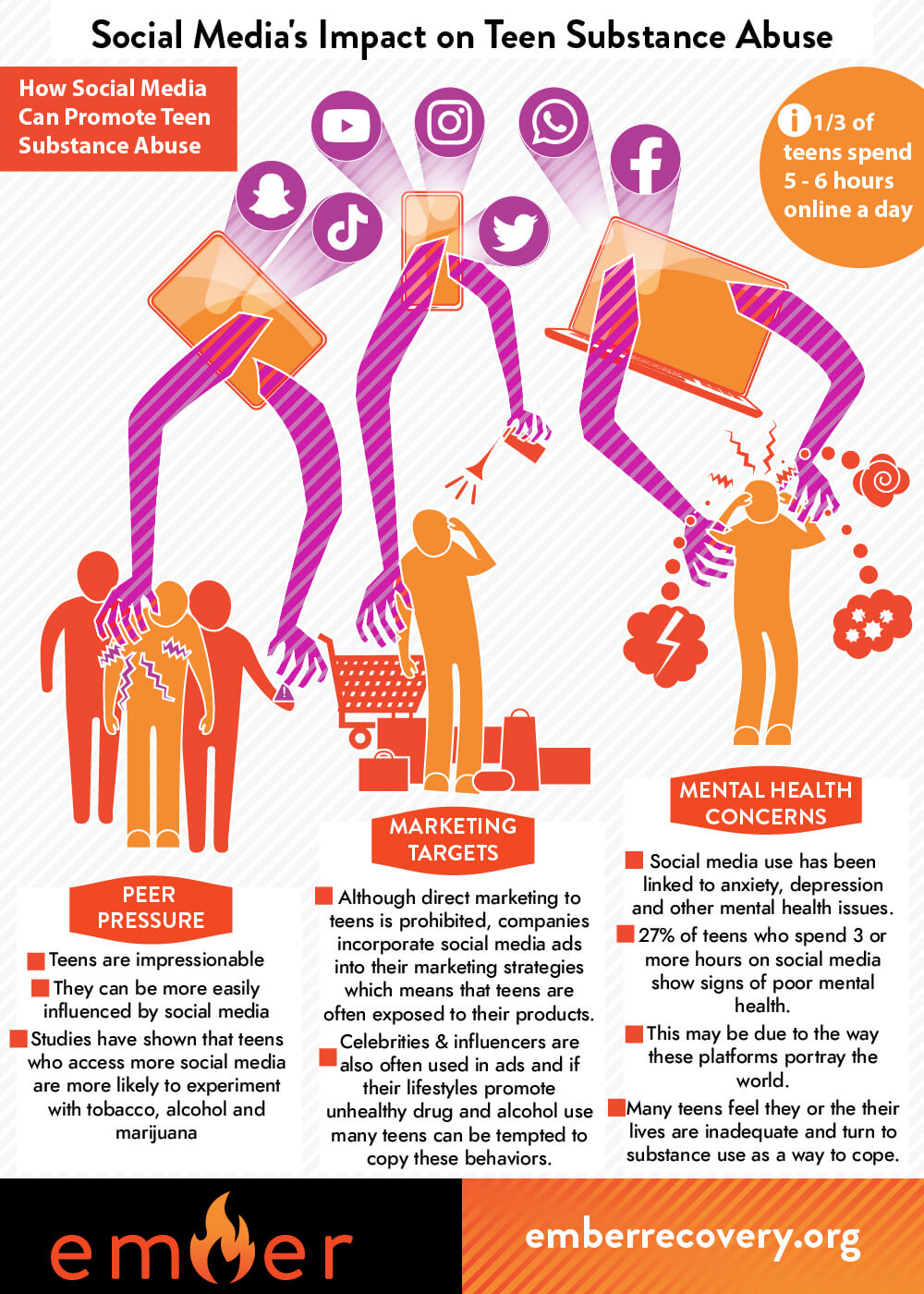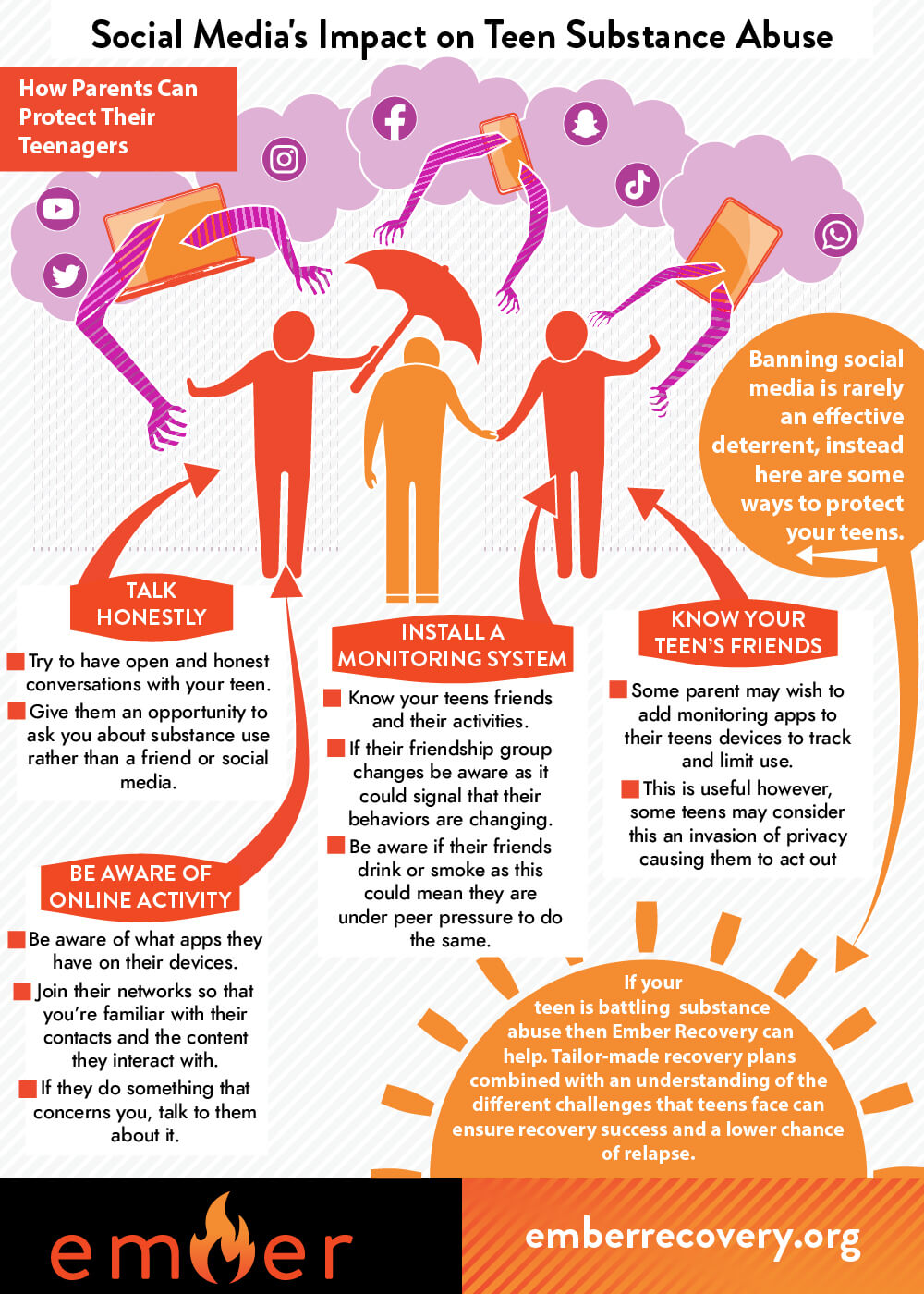A recent survey shows that one-third of teens spend 5 to 6 hours online a day.1 When teens are online, they can be on social media platforms, chatting with their friends, or watching endless videos of just about anything out there. The more time teens spend online and on social media, the greater its influence on them in all areas of their lives, especially regarding teen substance abuse.
While teens may think they are just watching images, the impact that they can have is far-reaching and potentially dangerous. We will look at what parents can do to protect their teenagers from social media’s impact and why getting help for teen substance abuse is so important.
How Social Media Can Promote Teen Substance Abuse
Peer Pressure
Social media messages run the gamut. From sometimes dangerous challenges to videos and stories about celebrities, teens are exposed to so much when they go online. Teens are very vulnerable to what they see online and can be exposed to peer pressure and influences, leading them to experiment with drugs. One study found that teens who use social media are more apt to use marijuana, tobacco, and alcohol compared to teens who were not on those social media platforms.2
Continued after video:
Marketing Targets
Many marketing companies have also realized social media’s reach on teens and often use these platforms to sell tobacco, electronic cigarettes, and other items.2 Although direct marketing to minors is against the law, social media platforms have been made part of marketing strategies that are widely accessible to teens.
Many digital ads use celebrities to promote their products. When they see famous people on Instagram, Snapchat, and other platforms using drugs and alcohol, they may be tempted to do the same.
Mental Health Concerns
Besides marketing exposure, social media can also lead to mental health problems, which in turn can lead to substance abuse. Studies have shown that about 27% of children who spend 3 or more hours daily on social media show signs of poor mental health.3
Social media use has been linked to depression and anxiety because of how these types of platforms portray the world. Teens may see others who seem to have more than they do which can make them depressed. Feelings of depression can lead to substance abuse as teens look for a way to feel better about themselves.
How Parents Can Protect Their Teenagers
As parents learn how social media can promote teen substance abuse, their first instinct is to protect their kids. But keeping images of substance use away from your teenagers on social media is extremely difficult. Even if you block all apps, they’ll probably still see things on their friends’ devices. Teens are very resourceful and can easily trick their parents. Nevertheless, there are things parents can do to protect their teenagers.
Talk Honestly
The best way to protect your teenager is to have open and honest conversations about substance abuse and its dangers. Educate them about the risks and tell them you will always be there for them if they have questions or want to talk. Learning and hearing things from you rather than from social media or friends can help to prevent them from going down a dangerous path.
Be Aware of Online Activity
While you may not be able to wipe out all of the apps they use, you should be aware of what is on their devices and join their networks. This way, you can see who they are communicating with and what they post. If you see something questionable, ask them about it and have those open lines of communication that are so important.
Know Your Teen’s Friends
Know your teen’s friends and who they hang out with the most. If you see their group start to change, keep an eye because it could signal that their behaviors are also changing. If your child starts spending time with groups of teens who smoke or drink, you’ll want to be vigilant of any new activity that could signal peer pressure.
Install a Monitoring System
Some parents like installing monitoring systems on their teens’ devices to track and limit their screen time. But some teens may feel like this is an invasion of their privacy and may act out as a result.
Getting Help for Teen Substance Abuse at Ember Recovery
If your child is battling a teen substance abuse problem, Ember Recovery can help. We specialize in only helping young people because we know they face different challenges than adults. Our programs are geared towards them and their needs.
At Ember Recovery, we work to tailor a plan that fits each teen and gives them the best chance at success. These treatment plans can include different elements, including helping teens identify and confront the reasons for their addiction. Without understanding these, teens may be more prone to relapse.
To learn more about our programs, contact Ember Recovery. Call us or send us a message online so we can begin to develop a treatment plan to help your teenager.
Sources:
[1] https://local12.com/news/local/survey-most-kids-spend-more-than-5-hours-a-day-on-social-media-or-video-games. [2] https://www.jahonline.org/article/S1054-139X(17)30158-1/pdf [3] https://www.mcleanhospital.org/essential/it-or-not-social-medias-affecting-your-mental-health
Andrea Dickerson is a Licensed Therapist and Certified Substance Use Counselor who has worked in behavioral health since 1997. Currently, Andrea is the Director of Behavioral Health, overseeing the Ember residential treatment programs and YSS outpatient counseling clinics throughout Central and North Central Iowa. She became a Motivational Interviewing (MI) trainer in 2006 and provides MI trainings throughout Iowa.
Andrea specializes in working with adolescents and their families and enjoys seeing the family relationships grow through therapy. Andrea is also a CARF International Surveyor, going around North America ensuring behavioral health organizations are meeting required standards.
In her free time, Andrea enjoys cheering on the Iowa Hawkeyes and Chicago Cubs, as well as being an active member of Soroptimist International of the Americas (SIA), a global organization that provides women and girls with access to the education and training they need to achieve economic empowerment. She has been a member of the SI of Des Moines club since 2012 and has been actively involved at the regional level, currently serving as Co-Governor of the Peaks to Plains Region.
Through her involvement in SIA, Andrea has been actively involved in the Dream Programs, coordinating annual Dream It, Be It: Career Support for Girls projects, which give girls the tools they need to achieve their education and career goals, empowering them to break cycles of poverty, violence, and abuse.


